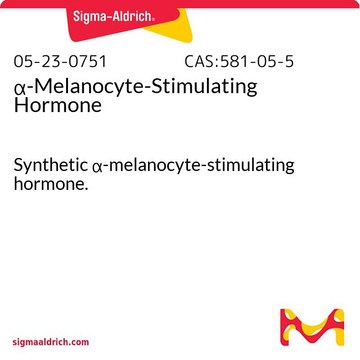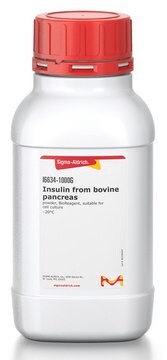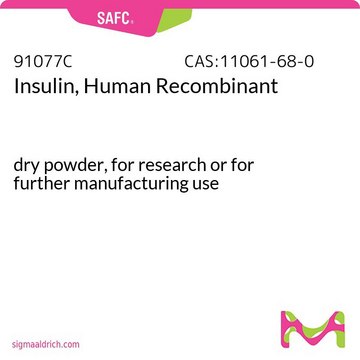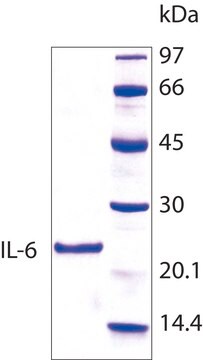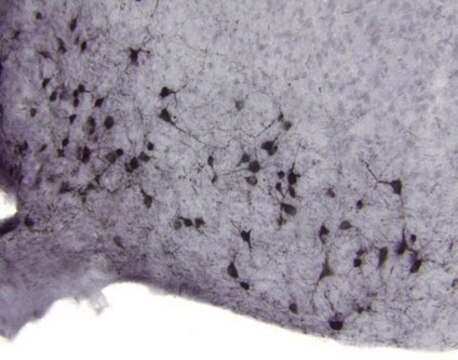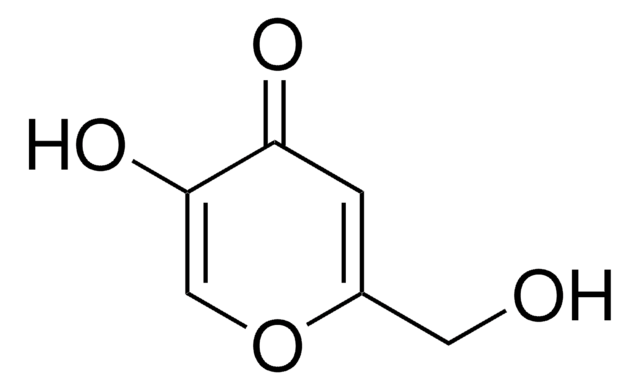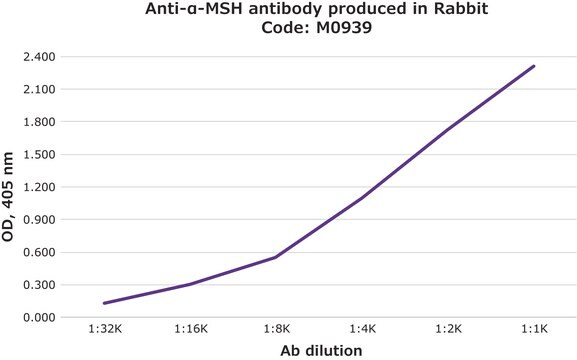M4135
α-Melanocyte stimulating hormone
≥97% (HPLC)
Sinônimo(s):
α-MSH, α-Melanotropin
About This Item
Produtos recomendados
fonte biológica
synthetic (organic)
Nível de qualidade
esterilidade
non-sterile
Ensaio
≥97% (HPLC)
Formulário
powder
solubilidade
water: 1.00-1.04 mg/mL, clear, colorless
nº de adesão UniProt
Condições de expedição
ambient
temperatura de armazenamento
−20°C
cadeia de caracteres SMILES
CSCC[C@H](NC(=O)[C@H](CO)NC(=O)[C@H](Cc1ccc(O)cc1)NC(=O)[C@H](CO)NC(C)=O)C(=O)N[C@@H](CCC(O)=O)C(=O)N[C@@H](Cc2c[nH]cn2)C(=O)N[C@@H](Cc3ccccc3)C(=O)N[C@@H](CCCNC(N)=N)C(=O)N[C@@H](Cc4c[nH]c5ccccc45)C(=O)NCC(=O)N[C@@H](CCCCN)C(=O)N6CCC[C@H]6C(=O)N[C@@H](C(C)C)C(N)=O
InChI
1S/C77H109N21O19S/c1-42(2)64(65(79)106)97-75(116)61-20-13-30-98(61)76(117)54(18-10-11-28-78)88-62(103)38-85-66(107)57(34-46-36-84-50-17-9-8-16-49(46)50)94-67(108)51(19-12-29-83-77(80)81)89-70(111)55(32-44-14-6-5-7-15-44)92-72(113)58(35-47-37-82-41-86-47)95-68(109)52(25-26-63(104)105)90-69(110)53(27-31-118-4)91-74(115)60(40-100)96-71(112)56(33-45-21-23-48(102)24-22-45)93-73(114)59(39-99)87-43(3)101/h5-9,14-17,21-24,36-37,41-42,51-61,64,84,99-100,102H,10-13,18-20,25-35,38-40,78H2,1-4H3,(H2,79,106)(H,82,86)(H,85,107)(H,87,101)(H,88,103)(H,89,111)(H,90,110)(H,91,115)(H,92,113)(H,93,114)(H,94,108)(H,95,109)(H,96,112)(H,97,116)(H,104,105)(H4,80,81,83)/t51-,52-,53-,54-,55-,56-,57-,58-,59-,60-,61-,64-/m0/s1
chave InChI
WHNFPRLDDSXQCL-UAZQEYIDSA-N
Informações sobre genes
human ... POMC(5443)
Procurando produtos similares? Visita Guia de comparação de produtos
Categorias relacionadas
Amino Acid Sequence
Descrição geral
Aplicação
- it has been Intracerebroventricularly (icv) injected to mice for behavioral studies.
- to determine the effect of α−MSH on growth of stationary Nb 2 node lymphoma cell cultures.
- to determine the effect of α−MSH on leptin secretion in the primary cultures of differentiated adipocytes.
- α−MSH promoted melanin production in the B16-F1 cells from murine melanoma cell line.
Ações bioquímicas/fisiológicas
Adsorvente de anticorpo
Ligação
Outras notas
Código de classe de armazenamento
11 - Combustible Solids
Classe de risco de água (WGK)
WGK 3
Ponto de fulgor (°F)
Not applicable
Ponto de fulgor (°C)
Not applicable
Equipamento de proteção individual
Eyeshields, Gloves, type N95 (US)
Escolha uma das versões mais recentes:
Já possui este produto?
Encontre a documentação dos produtos que você adquiriu recentemente na biblioteca de documentos.
Os clientes também visualizaram
Nossa equipe de cientistas tem experiência em todas as áreas de pesquisa, incluindo Life Sciences, ciência de materiais, síntese química, cromatografia, química analítica e muitas outras.
Entre em contato com a assistência técnica

